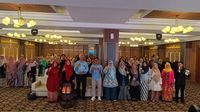As urbanization rapidly transforms Indonesia, the impact on language use is becoming increasingly evident. The movement of people from rural areas to cities is not just changing lifestyles; it’s also reshaping communication patterns, particularly in the use of Bahasa Indonesia and regional languages.
According to a recent article published on May 6, 2025, urbanization has led to a more heterogeneous society where Bahasa Indonesia emerges as the primary mode of communication. This shift has resulted in a significant decline in the use of regional languages, especially among the younger generation, who tend to favor the national language or even slang in their daily conversations.
"The rise of slang and mixed languages in big cities poses a challenge to the structure and vocabulary of formal Bahasa Indonesia," the article notes, highlighting a growing concern among linguists and educators. As children adapt to urban life, many are losing their ability to communicate in their native dialects, which can lead to a disconnect from their cultural roots.
In a related educational context, a seminar held in Bandung on the same day aimed to address some of these issues. The Musyawarah Guru Mata Pelajaran (MGMP) Bahasa Indonesia collaborated with the Prodi Magister Pendidikan Bahasa dan Sastra Indonesia (MPBSI) Pascasarjana Unpas to host an educational seminar themed "Deep Learning in Indonesian Language Learning." The event, attended by over 100 teachers from Bandung Raya, emphasized the importance of innovative teaching methods to enhance literacy and numeracy skills among students.
Dr. Hj. Siti Sadiah Yuningsih, an analyst from the Education Office, expressed optimism about the seminar's potential impact. "We hope this event will positively influence students' capabilities in Bandung and Cimahi," she stated. The seminar featured Dr. Hj. R. Panca Pertiwi Hidayati, who underscored the significance of incorporating new methodologies into language education.
As urbanization continues to evolve, the challenge of maintaining the purity of Bahasa Indonesia alongside regional languages becomes increasingly pressing. The article emphasizes that education plays a vital role in this regard. Schools must not only promote the proper use of Bahasa Indonesia but also encourage the preservation of regional languages as cultural heritage.
"The responsibility for maintaining the integrity of Bahasa Indonesia lies not only with educational institutions but also with families and the media," the article asserts. Parents are encouraged to foster an environment where proper language use is valued, while media outlets can set positive examples through their language practices.
In addition to educational initiatives, the government has also recognized the need for regulatory measures. An announcement from the Badan Pengembangan dan Pembinaan Bahasa revealed new guidelines aimed at strengthening and supervising the use of Bahasa Indonesia across various sectors. The regulation, known as Peraturan Menteri Pendidikan Dasar dan Menengah Republik Indonesia Nomor 2 Tahun 2025, is designed to ensure that the national language is used correctly and effectively in all aspects of national life.
"This regulation reflects the government's seriousness in prioritizing the use of Bahasa Indonesia according to existing laws," the announcement stated, urging the public, government institutions, and the media to comply with these guidelines. By establishing a framework for proper language use, the government hopes to elevate the status of Bahasa Indonesia as both a national and state language.
Moreover, the article discusses the concept of "ekoliterasi," or environmental literacy, which is becoming increasingly relevant in the context of language education. Ekoliterasi involves understanding and actively participating in maintaining ecological balance, and it can be integrated into Bahasa Indonesia lessons. For instance, using texts that address environmental issues can not only enhance language skills but also instill a sense of responsibility towards the environment among students.
The integration of environmental themes into language education is crucial, as children are the future stewards of the planet. By equipping them with the ability to articulate their thoughts on environmental matters, educators can help foster a generation that values both language and ecological sustainability.
As urbanization continues to shape Indonesia, the interplay between language, culture, and identity remains a focal point of discussion. The challenges posed by the decline of regional languages and the rise of slang highlight the need for a collective effort to preserve linguistic diversity while promoting a unified national identity.
Ultimately, the future of Bahasa Indonesia and regional languages in Indonesia hinges on the commitment of educators, families, and policymakers to nurture and protect linguistic heritage amid the tides of urban change. The articles published on May 6, 2025, serve as a call to action for all stakeholders to engage in this vital endeavor.

